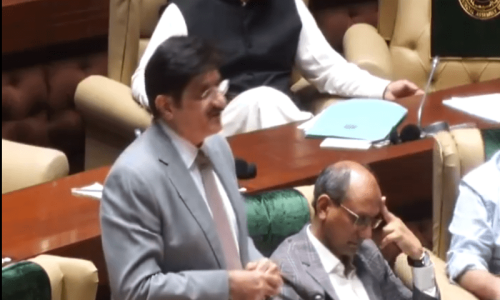KARACHI: There is a connection between the history of art, especially music, and the history of medicine that is often ignored but should be taught to students of medicine.
This was the core argument presented by distinguished photographer, explorer and cardiothoracic surgeon Dr Amjad Hussain at a lecture titled ‘Of Billroths and Beethovens’ in the Aga Khan University auditorium on Monday evening.
Dr Hussain peppered his talk with anecdotes and played pieces of music that kept engaged the audience, who had turned up in a relatively small number. He said during the course of his presentation, divided into three sections, that he would try and connect the subjects of medicine and music by touching upon the lives of Austrian surgeon Christian A. Theodore Billroth (1829-1894) and the legendary music composer Beethoven. In between he brought up the names of his teachers who did not merely teach and practise medicine but had other interests (art, music and literature) as well.
The first part of the lecture was Dr Hussain’s quest and pilgrimage as a young man to medical shrines after he completed his studies. This meant the cities and institutions that he went to and got to know ‘crazy’ doctors who achieved extraordinary feats in their profession. In that regard he mentioned five cities — Cleveland, London, Vienna, Ankara and Kabul — where he met some individuals he had heard about, and to learn more about medicine from them. In Cleveland he ran into a doctor who had pioneered concepts of bypass surgery and in London saw a doctor who pioneered surgery for a shunt. But it was in Vienna that, Dr Hussain said, he sensed something different when he paid a visit to the Billroth clinic, where he saw a statue of the famous Austrian surgeon and a series of pictures of surgeons on a wall which indicated the ‘continuity of history’.
At that point, he showed a photograph in which Billroth was seen alongside his friends Eduard Hanslick and the eminent composer Johannes Brahms. There he also got to see the specimen of the first gastrectomy ever done (by Billroth), diagrams made by the late doctor, and old books. He called the Viennese man a great thinker and doer.
Dr Hussain informed the audience that when last year he landed in Vienna he went to Billroth’s grave. He noticed that it was close to the master composer Beethoven’s gravesite.
After that Dr Hussain mentioned his trip to Ankara which was a pleasant surprise to see a doctor perform cardiac transplant in a Third-World country. Lastly, came Kabul’s turn where at Avicenna Clinic he spent some time with Dr Robert Shaw.
However, when in the year 2000 he toured the city to write an article on the Taliban, he saw that no one even knew about Dr Shaw or about the fact that once an open-heart surgery was performed at the clinic.
The second part of Dr Hussain’s lecture was on the history of a few great ideas. He briefly spoke on surgeon William Beaumont (1785-1853) from whom came the knowledge of ‘gastric physiology’ and Sir Henry Souttar (1865-1964) — the first man to use his fingers to explore a valve — and Dr Charles Bailey (1932-1993), a pioneer heart surgeon.
The third and last part of Dr Hussain’s presentation focused on the parallel between history of music and history of medicine. Giving the example of the famous conductor Leonard Bernstein, he highlighted the fact that while conducting music he knew about the musical score and its history as it came through the ages. He said: “Why can’t we do the same while doing surgery?” and insisted that students of medicine should be taught the history of their subject as well as other subjects so that they could know that things didn’t happen just like that; they’re part of the continuity of history.
Published in Dawn, December 2nd, 2014















































Dear visitor, the comments section is undergoing an overhaul and will return soon.